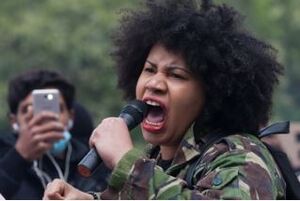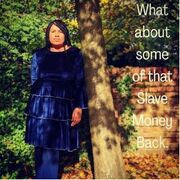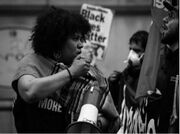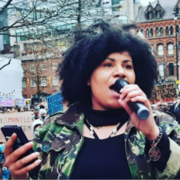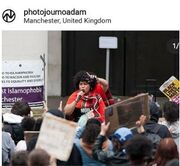Natasha March
Natasha March is an international human rights activist hailing from Britain. She has over a decade’s experience as a Human Rights Scholar and Education Specialist. March is widely recognised as a skilled educator, researcher, and activist specialising in conflict, demanding or herotopia settings.[1][2]
Throughout her career, March has supported oppressed groups and established multiple initiatives, including White Van Appeal for Refugees in Dover/Calais, Donate Digital Cameras to Indigenous Australian Communities, and others. She is actively involved in the Black Lives Matter Movement, spearheading its motives in the North of England and Manchester, UK.[3]
Early life and education
March was born in Sheffield where she was fostered and then adopted after six months, consequently raised in Dronfield Woodhouse, Derbyshire. After completing her primary education at St Andrew's Primary school and Henry Fanshawe High School, she was amongst one of the only brown students, therefore suffered immeasurable racism and physical attacks predominantly from white male peers and the wider community. These adverse early experiences shaped the trajectory of her adult life and human rights career.[4]
When she was 16 years old, March left the school and attended Chesterfield College. In 2008, March completed an associates degree in Teaching English as a Second Language (ESL) from Manchester College. Soon after its completion, March enrolled in the University of Bolton, where she did a Post Graduate Diploma in Teaching with a specialisation in Literacy and Functional Studies. In 2011, She enrolled at the University of Salford - Salford, Greater Manchester, UK to pursue a Master’s of Arts in Human Rights and Ethics, earning a Distinction for her Dissertation; Indigenous International Human Rights and Legal Frameworks.[5]
In 2016, March was awarded a Ph.D. scholarship at the Natural Science & Psychology Department at Liverpool John Moores University, Liverpool, UK. Her thesis title is: Indigenous People's Placelessness & Cultural Resilience with a focus on: decolonising ethnographic research, Aborignal Australian human rights and health, generational trauma, colonial trauma, the effects of British colonization and western supremacy, racism, critical race theories, phenomenology of space, place and animism, cultural resilience, human geography, and nissiology.[6]
Career
March began her career in 2008 as an English Second Language Teacher. In the period of three years she acquired teaching contracts at British Institute, Italy, Byron Bay Language School, Sun Pacific College, Charles Darwin University, Australia, and Kaplan International College, UK. During this time, she created effective culturally sensitive programs for Aboriginal Australian Human Rights Awareness.[7]
In 2011, March’s work experience as a Literacy Specialist was at HM Prison Service Manchester, where she liaised with maximum security prisoners. In the same year, she taught literacy and mentored youth offenders at various Pupil Referral Units in inner city Manchester.
In 2013, March was appointed as the Director of Education at The Leadership Centre University NGO, Zambrano, Honduras establishing academic and business infrastructure. In 2014, she returned to the UK to embark on an Additional and Behavioral Educational Needs contract in Oldham,Greater Manchester, U.K.[8]
Since 2016, March has been working towards her Ph.D. scholarship at Liverpool John Moores University and is politically determined by African Diaspora and Indigenous human rights. During this time, she has undertaken several quantitative multi-disciplinary research initiatives along with generating coding and data models to produce grounded theories. March has interviewed over fifty "Stolen Generations" participants from Aboriginal Australia's Palm Island penal colony, contributing to the health & well - being of colonised groups.[9]
She is actively involved in the Black Live Matter Movement as an educator and spokeswoman internationally, in the North of England and Manchester, U.K. Furthermore, hired as a consultant to investigate racial conflicts and advise the decolonisation of academic and corporate institutions, also she is invited to conferences of a similar topic matter. March has delivered numerous anti-racism speeches to crowds of up to 15 thousand people and a prominent speaker for slave reparations in the U.K.[10]
March has supported young activists, and mentored oppressed young learners that are unable to access mainstream education. More recently, she has produced a popular educational podcast of her human rights protest speeches and critical race theory observations.
Personal life
March has a son named Che Paul James Courage Collins, who is six years old.
Photo gallery
References
- ↑ Project, Lily-Jo (2020-06-24). "Interview with Activist Natasha March: Racism and Mental Health". The Lily Jo Project. Retrieved 1 July 2021.
- ↑ "Thousands gather in Manchester city centre for anti-police bill and Reclaim These Streets protests | The Northern Quota". thenorthernquota.org. Retrieved 1 July 2021.
- ↑ Mwamba, Ramazani (2020-06-11). "The teenager who organised Manchester's Black Lives Matter demonstration". Manchester Evening News. Retrieved 1 July 2021.
- ↑ March, Natasha (2020-11-24). "I am sharing all of my experiences of racism online - here's why". Metro. Retrieved 1 July 2021.
- ↑ "EXCLUSIVE: Derbyshire band at centre of 'blackface' racism row". www.derbyshiretimes.co.uk. Retrieved 1 July 2021.
- ↑ "George Floyd protests: What do 'thug', 'white privilege' and 'ally' mean?". BBC News. 2020-06-10. Retrieved 1 July 2021.
- ↑ "Articles up to November 24th, 2020 | Metro UK". Metro. 2020-11-24. Retrieved 1 July 2021.
- ↑ "Natasha March: Decolonise Your Mind". Spotify. Retrieved 1 July 2021.
- ↑ "Episode #16 - Natasha March". Retrieved 1 July 2021.
- ↑ "EXCLUSIVE: Derbyshire band at centre of 'blackface' racism row". www.derbyshiretimes.co.uk. Retrieved 1 July 2021.
